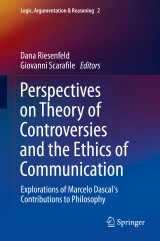Details

Perspectives on Theory of Controversies and the Ethics of Communication
Explorations of Marcelo Dascal's Contributions to PhilosophyLogic, Argumentation & Reasoning, Band 2
|
96,29 € |
|
| Verlag: | Springer |
| Format: | |
| Veröffentl.: | 23.11.2013 |
| ISBN/EAN: | 9789400771314 |
| Sprache: | englisch |
| Anzahl Seiten: | 219 |
Dieses eBook enthält ein Wasserzeichen.
Beschreibungen
<p>Assembling an unprecedented range of considered responses to the noted contributions to philosophy made by Marcelo Dascal, this collection comprises the work of his many friends, colleagues and former students. Beginning with a series of articles on Dascal’s influential insights on philosophical controversy, this volume continues with explorations of Dascal’s celebrated scholarship on Liebnitz, before moving on to papers dealing with his philosophy of language, including interpretations by Dresner and Herring on the phenomenon of emoticons. Taken as a whole, they provide a compelling commentary on Dascal’s prolific and voluminous publications and include fresh perspectives on the theory of argumentation and the ethics of communication. </p><p>The material collected here extends to political philosophy, such as Morris-Reich's paper exploring the ways in which German social scientists confront issues of antisemitism, the psychology of genius, and the origins of norms in society and culture. Much of the analysis is directly connected to, or influenced by, the philosophical themes, ideas and concepts developed throughout the years by Marcelo Dascal, while others have a looser connection to his work. All of them, however, attest to the remarkable and multifaceted philosophical persona of Marcelo Dascal, who is the guiding light of the rich conceptual dialogue running through this book. <b></b></p>
<p>Introductory Essay - «Sob o mesmo céu». Listening and Dialogue as Ethics of Communication; Giovanni Scarafile.- Chapter 1. The Exclusion Argument; Yaron Senderowicz.- Chapter 2. Rationality and Controversy. Reading Darwin through Dascalian eyes; Anna Carolina Regner.- Chapter 3. Extrinsical or Intrinsical Necessity? Hobbes and Bramhall on Free Will; Daniel Mishori.- Chapter 4. Locke and Leibniz on the Balance of Reasons; Markku Roinila.- Chapter 5. Harmonizing the Poles: A Note on Leibniz's Notion of Justice; Noa Naaman-Zauderer.- Chapter 6. On the ‘Sum of all Differences’ and the Origin of Mathematics according to Leibniz: Mathematical and Philosophical Aspects; Michel Serfati.- Chapter 7. Emoticons and Illocutionary Force; Eli Dresner and Susan C. Herring.- Chapter 8. Brandom and the Boy who Cried Wolf; Dana Riesenfeld.- Chapter 9. Speaker’s Meaning: With Reference to Marcelo Dascal’s book Mashav Ha-Ruah; Rodica Amel.- Chapter 10. Religion and Politics: The Controversy over the Political Mandate of the Protestant Church in Germany (EKD) Relating to the Eastern Policy 1950-1972; Hartmut Rudolph.- Chapter 11. The Dynamic Role of Toleration in an Emerging Pluralism; Herzl Baruch.- Chapter 12. Elements of Controversy: Responses to Antisemitism in nascent German Social Science; Amos Morris-Reich.- Chapter 13. The “esprit prophetique”: Brief Remarks on the Phenomenology of Genius in Diderot; Giovanni Scarafile.- Chapter 14. On what is Harmful: The Negative Basis of Normative Agreements; Carlos Thiebaut.- Chapter 15. Unity of science and encyclopaedia: From the Idea to the Configurations; Olga Pombo.- Chapter 16. Habit, Self-Organization, and Abduction; Ramon, S.C. de Andrade, Mariana C. Broens, Itala M.L. D’Ottaviano, Maria E.Q. Gonzalez.- Chapter 17. Dialogues and Monologues in Logic; Shahid Rahman.- Chapter 18. A Controversy that Never Happened: Ancient and Modern Concepts of Opinion, Knowledge and Information-Seeking Behavior; Peter J.Schulz.- Chapter 19. Postface. Philosophical Dialogue; Marcelo Dascal.</p>
<p>Assembling an unprecedented range of considered responses to the noted contributions to philosophy made by Marcelo Dascal, this collection comprises the work of his many friends, colleagues and former students. Beginning with a series of articles on Dascal’s influential insights on philosophical controversy, this volume continues with explorations of Dascal’s celebrated scholarship on Liebnitz, before moving on to papers dealing with his philosophy of language, including interpretations by Dresner and Herring on the phenomenon of emoticons. Taken as a whole, they provide a compelling commentary on Dascal’s prolific and voluminous publications and include fresh perspectives on the theory of argumentation and the ethics of communication. </p><p>The material collected here extends to political philosophy, such as Morris-Reich's paper exploring the ways in which German social scientists confront issues of antisemitism, the psychology of genius, and the origins of norms in society and culture. Much of the analysis is directly connected to, or influenced by, the philosophical themes, ideas and concepts developed throughout the years by Marcelo Dascal, while others have a looser connection to his work. All of them, however, attest to the remarkable and multifaceted philosophical persona of Marcelo Dascal, who is the guiding light of the rich conceptual dialogue running through this book. <b></b></p>
A unique collection of papers dedicated to renowned Brazilian-born Israeli philosopher and linguist Marcelo Dascal Vast range of papers addressing and developing features of Dascal’s seminal work Includes fresh approaches to the theory of argumentation and the ethics of communication?

















